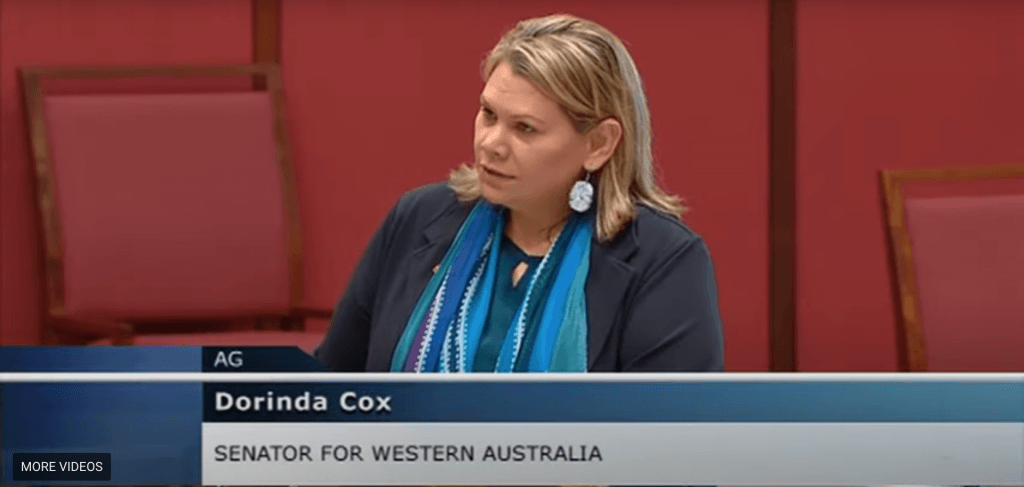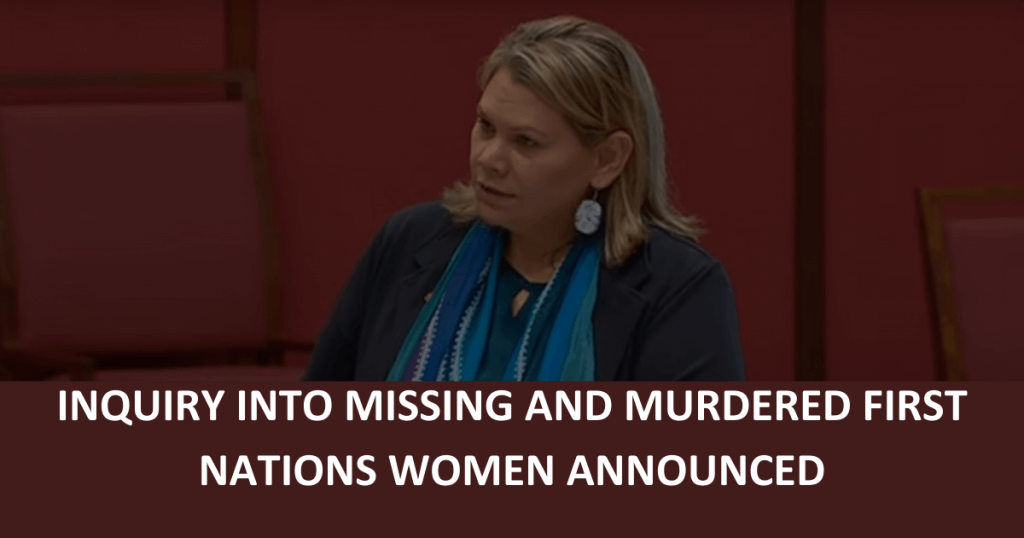Content warning: This story on First Nations women contains reference to a First Nations person who has died.
The Federal Senate has voted in favour of holding an inquiry into missing and murdered Aboriginal and Torres Strait Islander women and children.
Yamatji Noongar woman and Greens Senator for Western Australia Dorinda Cox tabled the motion. Cox called for the enquiry back in her first speech to the Senate in October.
It calls upon Legal and Constitutional Affairs References Committee to investigate and report on missing and murdered First Nation women and children.
The motion recieved unanimous support.
The first of its kind Inquiry into missing and murdered

The office of Senator Cox said the inquiry will be the first of its kind in Australia.
It will investigate “the systemic causes of violence including underlying social, economic, cultural, institutional and historical causes contributing to the ongoing violence and particular vulnerabilities of First Nations women and children”.
Senator Cox said she has heard from the many families left behind who wonder why the loss of their loved one goes unnoticed and why these cases continually go unsolved.
“This is necessary because we have a justice system that does not take seriously the issues of missing and murdered First Nations women and children in this country, so this inquiry will ask those question for those families,” she told NIT.
“It is devastating to hear from families who don’t understand why the system does not take these cases seriously… As a former police officer, I know there is a different urgency into looking for First Nations women and girls.”
“This is linked to family and domestic violence First Nations women face… which is why we want to understand the framework and social issues that lead to these cases so we can do better to understand how to protect these women and children.”
Stark over-representation of Indigenous women in missing person statistics
In December 2019, Federal shadow minister for Indigenous Australians Linda Burney called for a Senate inquiry into violence against Indigenous women “right across Australia”.
She said there was a “lack of urgency” around dealing with the violence, despite the stark over-representation of Indigenous women in missing persons statistics.
Ms Burney said the rate of Aboriginal women going missing or being victims of murder in Australia warranted “greater attention and consideration”.
“There is certainly a lack of urgency, a lack of recognition of the broader issue of violence in Australia and the amount of women who lose their lives,” she told the ABC at the time.
In August this year, a petition with thousands of signatures calling for an inquiry into murdered and missing First Nations women was formally tabled in Western Australia’s Parliament.
The petition called for an inquiry and for justice for the family of murdered Noongar woman Stacey Thorne.
Rosie Sahana, the MP for the Mining and Pastoral Region tabled the petition in WA Parliament.
“To this day no one has been held to account for her (Stacey Thorne’s) horrific murder,” Ms Sahana told WA parliament.
“Aboriginal women in West Australia are at a high risk of murder… There is also racism by the criminal justice system, leaving them and their children vulnerable,” she said.
Inquiry into missing and murdered First Nations women
The motion:
That the following matter be referred to the Legal and Constitutional Affairs References Committee for inquiry and report by 30 June 2022:
Missing and murdered First Nations women and children with particular reference to:
a) The number of First Nations women and children who are missing and murdered;
b) The current and historical practices, including resources, to investigating the deaths and missing person reports of First Nations women and children in each jurisdiction compared to non-First Nations women and children;
c) The institutional legislation, policies and practices implemented in response to all forms of violence experienced by First Nations women and children;
d) The systemic causes of all forms of violence – including sexual violence – against First Nations women and children, including underlying social, economic, cultural, institutional and historical causes contributing to the ongoing violence and particular vulnerabilities of First Nations women and children;
e) The policies, practices and support services that have been effective in reducing violence and increasing safety of First Nations women and children, including self-determined strategies and initiatives;
f) The identification of concrete and effective actions that can be taken to remove systemic causes of violence and to increase the safety of First Nations women and children;
g) The ways in which missing and murdered First Nations women and children and their families can be honoured and commemorated; and
h) Any other related matters
Sarah is a civil solicitor who primarily practices in defamation, intentional torts against police, privacy and harassment.
- Sarah Gorehttps://obriensolicitors.com.au/author/sarahg/
- Sarah Gorehttps://obriensolicitors.com.au/author/sarahg/
- Sarah Gorehttps://obriensolicitors.com.au/author/sarahg/
- Sarah Gorehttps://obriensolicitors.com.au/author/sarahg/





